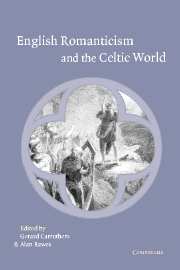Book contents
- Frontmatter
- Contents
- List of contributors
- Acknowledgements
- 1 Introduction: romancing the Celt
- 2 Sir William Jones, the Celtic Revival and the Oriental Renaissance
- 3 The critical response to Ossian's Romantic bequest
- 4 Blake and Gwendolen: territory, periphery and the proper name
- 5 The Welsh American dream: Iolo Morganwg, Robert Southey and the Madoc legend
- 6 Wordsworth, North Wales and the Celtic landscape
- 7 The force of ‘Celtic memories’ in Byron's thought
- 8 Shelley, Ireland and Romantic Orientalism
- 9 Byron and the ‘Ariosto of the North’
- 10 Scott and the British tourist
- 11 Felicia Hemans, Byronic cosmopolitanism and the ancient Welsh bards
- 12 Luttrell of Arran and the Romantic invention of Ireland
- 13 Contemporary Northern Irish poets and Romantic poetry
- Notes
- Bibliography
- Index
8 - Shelley, Ireland and Romantic Orientalism
Published online by Cambridge University Press: 22 September 2009
- Frontmatter
- Contents
- List of contributors
- Acknowledgements
- 1 Introduction: romancing the Celt
- 2 Sir William Jones, the Celtic Revival and the Oriental Renaissance
- 3 The critical response to Ossian's Romantic bequest
- 4 Blake and Gwendolen: territory, periphery and the proper name
- 5 The Welsh American dream: Iolo Morganwg, Robert Southey and the Madoc legend
- 6 Wordsworth, North Wales and the Celtic landscape
- 7 The force of ‘Celtic memories’ in Byron's thought
- 8 Shelley, Ireland and Romantic Orientalism
- 9 Byron and the ‘Ariosto of the North’
- 10 Scott and the British tourist
- 11 Felicia Hemans, Byronic cosmopolitanism and the ancient Welsh bards
- 12 Luttrell of Arran and the Romantic invention of Ireland
- 13 Contemporary Northern Irish poets and Romantic poetry
- Notes
- Bibliography
- Index
Summary
In Percy Bysshe Shelley's Laon and Cythna (1817), Cythna predicts the revolution she leads will spread from the eastern plains of Islam to ‘the green lands cradled in the roar / Of western waves’(v. 2263–4). If it is not clear exactly which ‘green lands’ Cythna is referring to here, a number of factors suggest that the most likely candidates are the British Isles or, to be precise, Britain and Ireland. Romantic Orientalism has historically been written and read from a European perspective. Shelley himself famously described the poem in an 1817 letter as an orientalised displacement of a European uprising. ‘It is a tale illustrative of such a Revolution’ he writes ‘as might be supposed to take place in an European nation’(SL, I, p. 563–4). Marilyn Butler, in a recent essay on Romantic Orientalism and narrative, interprets the genre as a political allegory for the turbulent situation in Britain in particular. Despite, or perhaps because of, Anglocentric readings like these, though, it is surprising that the Irish context of Shelley's Orientalism has, until recently, remained relatively unexplored. There is, after all, more than one green land cradled in the roar of western waves in Shelley's poem. This hidden context has only begun to emerge, ironically, as the study of Romantic Orientalism has shifted away from an exclusively European perspective.
- Type
- Chapter
- Information
- English Romanticism and the Celtic World , pp. 117 - 129Publisher: Cambridge University PressPrint publication year: 2003
- 1
- Cited by



